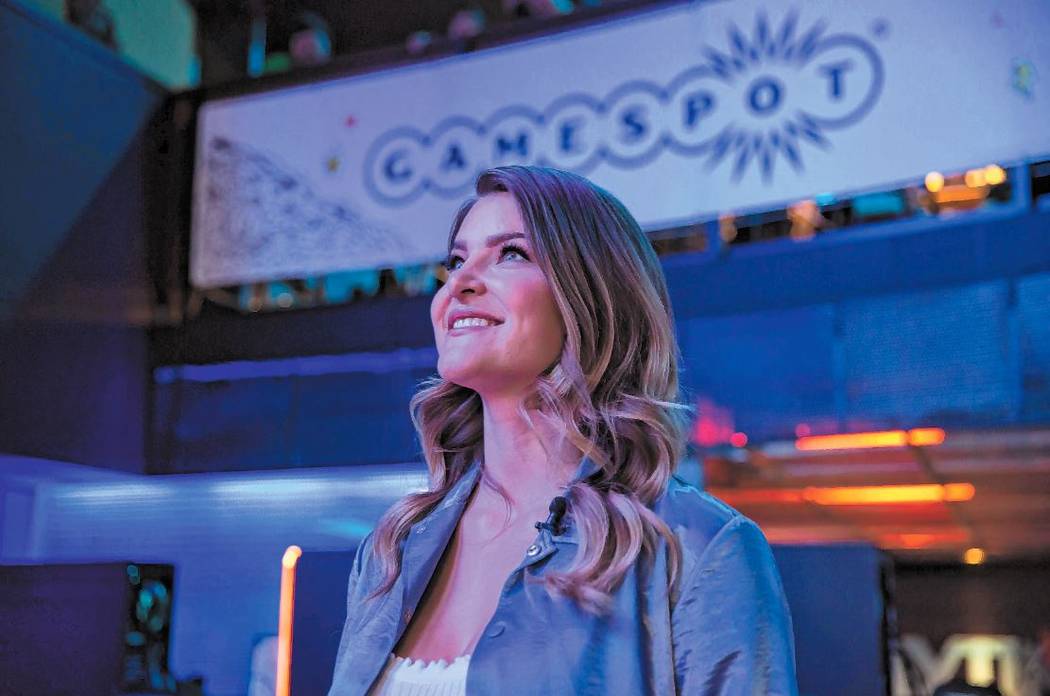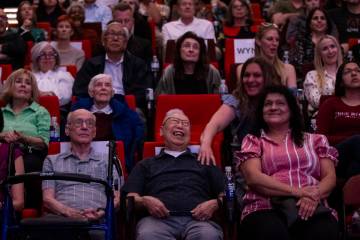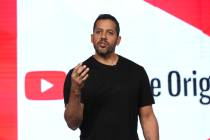Popular gamer ‘KittyPlays’ brings novel esports show to Las Vegas
It’s a bit past 2 p.m. on a Sunday — beware the hand cannon.
On a 30-by-30-foot screen inside the HyperX Esports Arena at Luxor, havoc is being wreaked on a spring afternoon, one pixelated-pickax swing at a time.
“Behind you!” KittyPlays warns as digitalized munitions pop and explode in a cacophony of color and sound.
“Got him,” her partner Myth replies as the action intensifies.
In a room full of gamers, a pair of professionals are going at it, seated at computer consoles onstage, teamed up against some soon-to-be vanquished opponents during a quick session of “Fornite,” the mammothly popular online shooter-survival game that’s been devouring the free time of millions over the past two years.
A capacity crowd packs the bleachers erected in the center of the room, ranging from preteens in baggy shorts to older dudes downing craft beers.
They watch the pros do their thing with the rapt, excitable attention to detail of color commentators breaking down a sporting event.
They do so during the debut of “Playtime With KittyPlays,” hosted by 27-year-old esports star Kristen Michaela — better known as KittyPlays to the 600,000 subscribers to her YouTube page, where the ascendant gamer has racked up more than 57 million views.
On this day in March, she’s launching something new to both her and esports: part talk show, part celebration of all things gaming related, “Playtime” rides a loose, playful vibe, featuring notables inside and outside the gaming world, from Cleveland Browns quarterback Baker Mayfield, who gets interviewed in a pretaped segment while wearing fuzzy Sasquatch slippers, explaining how gaming benefited his hand-eye coordination and ability to strategize quickly when he was young, to video drop-ins from popular players such as Pokimane and Bizzle.
“Playtime” returns for its second installment Friday, this time with a video drop-in from streamer and caster Ben “DrLupo” Lupo, a prerecorded interview with Minnesota Twins pitcher Trevor May and more.
Preaching to the nonconverted
“Playtime” is posited on inclusion and immersion, with fans in attendance being able to compete against star players and plenty there for any non-die-hards as well.
For instance, before gaming with Myth (Ali Kabbani), Michaela did a sit-down interview with the popular streamer, focusing less on wonky game talk and more on broader themes of dealing with success at an early age and the process of self-growth within the spotlight’s glare.
The show works on two levels: There’s abundant content for esports fanatics, but “Playtime” also is a conduit for casual gamers or those who maybe just want to peek into this booming industry.
“That’s been my goal over my career, to kind of create that bridge between people who don’t know a lot about gaming and people who know a lot about gaming and showing people that gaming isn’t a separate pillar,” Michaela explains. “You’ve got celebrities, pro athletes, musicians — people know a lot about those entertainment areas — but gaming is more of an umbrella. It’s not separate. Everyone can be a gamer, whether you’re playing ‘Candy Crush’ on your phone or high-level competitive ‘Counter-Strike.’ ”
For Michaela, this has all been a long time coming — sort of.
“Fifteen years ago, when I was 12 and playing ‘World of Warcraft’ and my mom was trying to get me to go outside, I’d turn around, ‘Mom, one day I’m going to get paid to play video games,’ ” she recalls.
“At the time, the only examples of that were game development or game testing, which are both very difficult jobs, as we now know. So this didn’t even occur to me that this would be a possibility at the time.”
A gaming game changer
To Michaela’s point, while competitive gaming has been around for decades, the modern esports explosion, where gamers have the ability to develop into stars and make six or even seven figures annually, in some cases, is a much more recent phenomenon, catalyzed in large part by the emergence of video streaming platform Twitch in 2011.
Twitch allows gamers to broadcast their gaming sessions while simultaneously showcasing their personalities, enabling them to potentially build massive followings.
Five and half years ago, Michaela got in on the action, but not with a career in mind.
“When I originally got into streaming, it was just to find friends, find more people to play with, because my brother and my dad were too busy to play with anymore,” she says. “I was already in commerce, studying accounting and finance, and after the first month I realized that, ‘Hey, nobody is taking this seriously as a career yet.’ You can apply really simple business tactics and this will open an entirely new world and new space for people to be able to thrive and earn a living doing something really fun for them, but also really fun for people to enjoy. That was a moment where I was like, ‘OK, let’s do this. I’m ready.’ ”
Since then, Michaela, a native of Canada who relocated to Los Angeles from Vancouver in March, has seen her profile rise dramatically as she’s become increasingly immersed in the industry: Nowadays, she’s an esports executive and consultant in addition to being a well-known streamer.
She not only hosts “Playtime,” but is also a co-producer of the show and was instrumental in developing its format, a process that began last fall.
“Right away, it came up that we wanted to showcase traditional media stars, like athletes or celebrities, to the gaming world,” Michaela says. “I think a lot of the gamers don’t know that (the athletes and celebrities) are into gaming, so it’s giving them an access point to say, ‘I am into gaming, I am legit,’ and accessing that new fan base while at the same time talking in an educated way about topics that are important to me and the gaming space.”
One such topic is the gender imbalance in esports, which Michaela addressed with Myth.
“Women lack the role model of competitive players,” she says.
Michaela notes that progress is being made, to this end. Now it’s time to make more.
“If I look at the women in gaming 5½ years ago, 10 years ago, versus now, that shift has changed astronomically,” Michaela says. “We have more pro women in esports. There’s a ton of successful female influencers.
“The gaming industry is still being written,” she continues. “I want women to be involved in those decisions about where we want to take the gaming industry. Hopefully, the opportunities that I have for myself to be very visual in this industry will be able to empower the 11-, 12-, 13-year -old girls who’ve had a passion for gaming. They can say, ‘Hey, look what they’re doing. I can do that, too.’ ”
Contact Jason Bracelin at jbracelin@reviewjournal.com or 702-383-0476. Follow @JasonBracelin on Twitter.






























